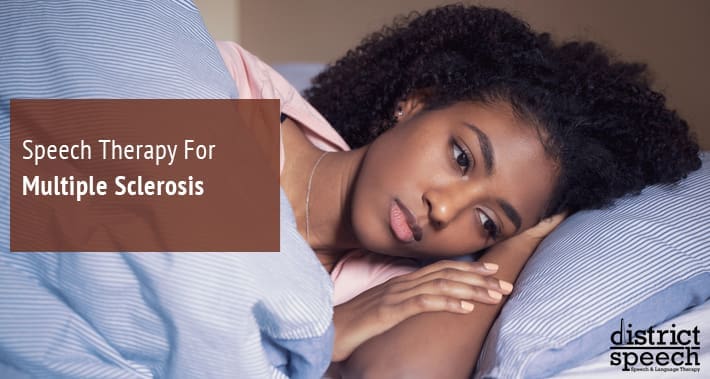
If you’ve had a diagnosis of multiple sclerosis, things may seem scary and uncertain.
But they don’t have to be.
There are a variety of treatments and therapies which can help manage symptoms and slow the progression of the disease, and help to improve the quality of life of those who have been diagnosed.
As a Washington DC speech therapy clinic, today we’re going to show you some aspects of multiple sclerosis related to speech and swallowing, and how a speech pathologist for adults can help.
Keep reading to learn more.
What Is Multiple Sclerosis?
Multiple sclerosis is an autoimmune condition which affects the central nervous system.
In people with MS, the immune system attacks the protective layer of myelin which protects nerve fibers.
At the present time, there is no known cure for multiple sclerosis, however, there are things people can do to help keep symptoms under control, manage the condition, and help reduce the instances of relapse.
What Causes Multiple Sclerosis?
At this point in time, the exact cause of multiple sclerosis is unknown.
Risk factors for MS include:
- Sex – women are more likely to have multiple sclerosis than men
- Genetic history – individuals with a parent or sibling with MS are more likely to develop it
- Age – onset is typically between the ages of twenty and forty
- Infection – some viruses, such as the Epstein Barr virus have been linked to MS
- Climate – MS is more common in temperate climates
- Low levels of vitamin D
- Smoking
- Ethnicity – white people are at the highest risk of developing MS
- Presence of other autoimmune conditions
Symptoms Of Multiple Sclerosis
The presentation and severity of multiple sclerosis can vary widely from person to person.
However, some of the most common symptoms include:
- Tiredness and fatigue which may interfere with the ability to complete tasks
- Pain which may be acute or chronic
- Tremors
- Difficulty sleeping
- Bladder control issues
- Trouble chewing and swallowing
- Brain fog and concentration issues
Additionally, people with multiple sclerosis may have vision issues which can include:
- Blindness
- Involuntary eye movements
- Double vision
- Pain in the eyes
- Blurred vision
And they may also experience trouble walking, due to:
- Muscle spasms
- Problems with balance
- Numbness in feet and legs
- Muscle weakness
Multiple sclerosis can also have specific impacts on speech and swallowing, which we will discuss in the next sections.
How Does Multiple Sclerosis Affect Speech?
Dysarthria is a disorder which affects the muscles required for speech.
Dysphonia is a term used to describe voice disorders.
Both are sometimes effects of multiple sclerosis.
Speech therapy for dysarthria addresses symptoms of the disorder, including:
- Long pauses during speech
- Slurring words
- Difficulty regulating the volume of speech
Those with dysphonia may experience issues related to vocal quality such as hoarseness, breathiness, issues with vocal quality, and nasal sounding speech.
Both conditions are due to muscle weakness and poor muscle coordination, especially for muscles which control speech such as the tongue and laryngeal muscles.
How Does Multiple Sclerosis Affect Swallowing?
Dysphagia is a condition in which swallowing is difficult.
It may take longer than would normally be expected, or even cause pain.
For some people with dysphagia, swallowing may even be impossible.
Swallowing is controlled by the same muscles responsible for speech, so individuals with dysarthria and dysphonia may also experience dysphagia.
For people with multiple sclerosis, these symptoms may occur intermittently and can sometimes appear mild.
Over time, if not dealt with issues with swallowing can lead to nutrition deficiencies and dehydration, so identifying and seeking treatment for these issues is incredibly important.

How Can A Speech Therapist For Multiple Sclerosis Help?
If you or your child has speech and swallowing issues related to multiple sclerosis, a speech therapist can help to provide interventions and treatments to help manage symptoms.
Generally, multiple sclerosis is the domain of speech therapy for adults, since pediatric MS is very rare.
However, since around 5,000 children in the United States have MS according to the National MS Society, pediatric speech therapy covers this field as well.
First, your speech therapist will need to do an evaluation to learn more about how much control you have over the muscles required for speech and swallowing.
This will generally include assessments of speed and timing, accuracy, range, coordination, and strength.
They will also examine how you breathe and the way you pronounce words.
Once this examination is complete, your speech therapist can make recommendations for treatment options which can help manage the specific issues you’re facing.
These may include:
- Exercises designed to strengthen the muscles associated with speaking and swallowing
- Exercises to improve articulation
- Suggesting modifications to food to help make it easier to swallow, including adjusting the viscosity, temperature, texture, and portion sizes
- Treatments meant to stimulate the lips, tongue, jaw, soft palate, pharynx, and larynx
Book Your Appointment With District Speech Today
Speech and swallowing issues related to multiple sclerosis may seem like a scary thing to have to deal with.
When symptoms begin to show, you might worry about your ability to communicate with others, or to enjoy food.
Thankfully, there is help.
We’re District Speech, and we have speech therapists serving the Washington DC area, as well as Arlington Virginia and surrounding area.
Book your appointment for a consultation with one of our experienced speech therapists today.
1300 I St NW, Suite 400 E,
Washington, DC 20005
- https://g.page/districtspeech
District Speech and Language Therapy specializes in speech therapy, physical therapy, and occupational therapy solutions, for both children and adults, in the Washington D.C and the Arlington Virginia areas.